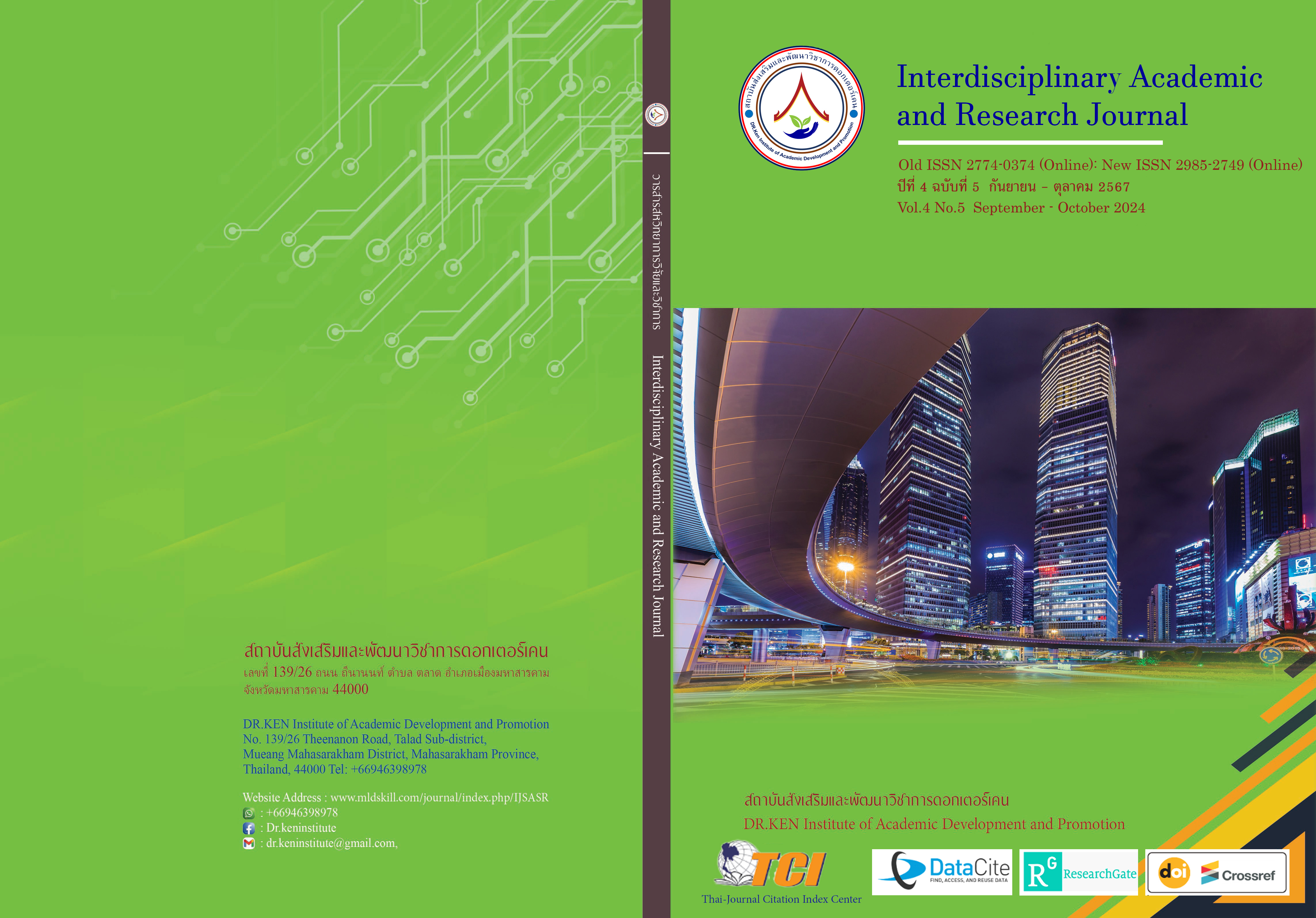The Role of Member of Parliament to Inspect the Usage of State Fiscal under The Constitution of the Kingdom of Thailand
DOI:
https://doi.org/10.60027/iarj.2024.281944Keywords:
Constitutional Law; , State Fiscal; , InspectionAbstract
Background and Aims: The research reveals that Thailand is governed under a democratic system where sovereignty belongs to the people, who elect MPs to represent them in overseeing national budget expenditures based on principles and methods prescribed by the Thai Constitution and supplementary laws. The purpose of this study is to investigate the role and responsibilities of members of the House of Representatives in scrutinizing the use of the national budget under the Kingdom of Thailand Constitution.
Methodology: This study examines academic documents and related laws and provides a descriptive presentation based on the study objectives.
Result: The finding found that Public finance must align with democratic principles, which include tax collection and the consent to public expenditure as fundamental fiscal principles. All expenditures and borrowings must be approved by the Parliament as representatives of the people. However, the principles, methods, and legal measures in the budgeting process stipulated by the Thai Constitution grant MPs limited power over the entire budgeting process. MPs can only review the budget once the annual budget bill is drafted and submitted to the House of Representatives for approval. This constraint creates challenges and limitations in budget oversight. For instance, Section 143 of the 2017 Constitution of the Kingdom of Thailand (B.E. 2560) mandates that the House of Representatives must analyze and consider the annual budget bill within 105 days of its submission. If the House fails to do so, the bill is considered approved and forwarded to the Senate. Additionally, Section 144 of the 2017 Constitution restricts MPs' discretionary power. It prohibits MPs, Senators, and committees involved in drafting the Annual Appropriations Budget Bill, Mid-Year Budget Bill, and Budget Transfer Bill from proposing amendments that increase budget allocations. This provision aims to prevent MPs, Senators, and committees related to the Budget Bills from influencing budget allocations directly or indirectly, addressing issues with MPs' discretion in using funds for constituency projects, which was a problem in the past. The researcher argues that the amendment of budget items or amounts differs from past practices where MPs directly controlled budget usage. Currently, any amendments must align with state projects where state agencies are the fund users, not MPs. Limiting MPs' discretion in deciding on state projects restricts their representative authority to utilize funds for public benefit. The researcher suggests expanding MPs' authority to cover the entire budgeting process and establishing clear legal frameworks for efficient and transparent budget oversight. This requires amending laws, including the Thai Constitution, the organic laws, the Budget Procedure Act B.E. 2561 (2018), and the House of Representatives meeting regulations of 2019, to empower MPs in controlling and overseeing the budgeting process from drafting to expenditure monitoring.
Conclusion: The findings highlight a significant limitation in the Thai budgeting process: MPs have limited power to influence and oversee budget decisions. The current legal framework restricts MPs' discretion, limiting their role to budget approval with no direct control over amendments or allocations. To improve transparency and public benefit, the study recommends amending relevant laws, including the Constitution, to give MPs more authority throughout the budgeting process.
References
กนกวรรณ คล้ายมณี. (2562). ปัญหาทางกฎหมายวินัยการเงินการคลังตามพระราชบัญญัติวินัยการเงินการคลังของรัฐ พ.ศ. 2561.วิทยานิพนธ์หลักสูตรมหาบัณฑิต: มหาวิทยาลัยรามคำแหง.
กานดา วรมงคลชัย. (2567). ระบบการบริหารราชการแผ่นดินของญี่ปุ่น. Retrieved on February 10, 2024., https://lawdrafter.blogspot.com/2019/05/blog-post_5.html .
กิตติพงศ์ กมลธรรมวงศ์. (2562). หลักการใหม่เกี่ยวกับสิทธิเสรีภาพของประชาชนในรัฐธรรมนูญแห่งราชอาณาจักรไทย พุทธศักราช 2560. กรุงเทพฯ : วิญญูชน.
คณะกรรมการร่างรัฐธรรมนูญ. (2562) ความมุ่งหมายและคำอธิบายประกอบรายมาตรา ของรัฐธรรมนูญแห่งราชอาณาจักรไทย พุทธศักราช 2560. กรุงเทพมหานคร:สำนักงานเลขาธิการสมาชิกสภาผู้แทนราษฎร.
ชาญชัย แสวงศักดิ์. (2566), กฎหมายเกี่ยวกับวินัยการเงินการคลังของรัฐ วิธีการงบประมาณและการตรวจเงินแผ่นดิน. พิมพ์ครั้งที่ 2. กรุงเทพฯ : วิญญูชน.
ปรีชา สุวรรณทัต. (2562). วิชาธรรมศาสตร์ว่าด้วยการคลังภาครัฐ. พิมพ์ครั้งที่ 6. กรุงเทพฯ : มหาวิทยาลัยธรรมศาสตร์.
ภาณุ จันทร์เจียวใช้. (2560). หลักนิติธรรมและหลักนิติรัฐของรัฐธรรมนูญแห่งราชอาณาจักรไทย พุทธศักราช 2560 ศึกษาเฉพาะประเด็นด้านการเงิน การคลัง และการงบประมาณ. สำนักงานศาลรัฐธรรมนูญ.
ภาวิณี ลอยฟ้า. (2561). การควบคุมการบริหารงบประมาณโดยกระบวนการนิติบัญญัติของสภาผู้แทนราษฎร. กรุงเทพฯ : สำนักงานเลขาธิการสภาผู้แทนราษฎร.
สำนักงบประมาณ.(2566). ปฏิทินงบประมาณรายจ่ายประจำปีงบประมาณ พ.ศ. 2567 (ฉบับปรับปรุง). Retrieved on February 10, 2024 from: dhttps://www.senate.go.th/assets/portals/ 147/fileups/324/files.
สุปรียา แก้วละเอียด. (2565). กฎหมายการคลังภาคงบประมาณแผ่นดิน. พิมพ์ครั้งที่ 2. กรุงเทพฯ : วิญญูชน.
อรพิน ผลสุวรรณ์ สบายรูป. (2553). กฎหมายเกี่ยวกับมาตรฐานกลางทางการเงินการคลังและการงบประมาณของประเทศไทยตามหลักการบริหารการคลังสมัยใหม่. วารสารนิติศาสตร์, 39(4), 700-740.
อานันท์ กระบวนศรี.(2566). การควบคุมตรวจสอบความชอบด้วยกฎหมายของนิติกรรมทางปกครองและการใช้ดุลพินิจของฝ่ายปกครองโดยศาลปกครองฝรั่งเศส. วารสารนิติศาสตร์ปรีดี พนมยงค์, 12(1),132-172.
Downloads
Published
How to Cite
Issue
Section
License
Copyright (c) 2024 Interdisciplinary Academic and Research Journal

This work is licensed under a Creative Commons Attribution-NonCommercial-NoDerivatives 4.0 International License.
Copyright on any article in the Interdisciplinary Academic and Research Journal is retained by the author(s) under the under the Creative Commons Attribution-NonCommercial-NoDerivatives 4.0 International License. Permission to use text, content, images, etc. of publication. Any user to read, download, copy, distribute, print, search, or link to the full texts of articles, crawl them for indexing, pass them as data to software, or use them for any other lawful purpose. But do not use it for commercial use or with the intent to benefit any business.
















.png)


